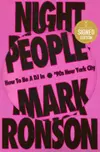
Scott Graham

Added to listOwnedwith 130 books.

Mark Ronson's memoir of rising up in the 90s club life, DJing for audiences of the NYC young and beautiful or rich and influential suddenly devolves into playing court jester for the people who made the music and took over the club scene. He gives the reader a quick look at the sordid underbelly of the people who create new music by chopping up and and stitching the bits back together, matching beats or lyrics together where they didn't originally come from, as a sort of Frankenstein's monster, but of the Peter Boyle variety rather than the Boris Karloff; at least you can dance to Peter Boyle's mumbled sample of "Puttin' on the Ritz" if you can overlap it with the hip hop song of the moment.
Mark Ronson's memoir of rising up in the 90s club life, DJing for audiences of the NYC young and beautiful or rich and influential suddenly devolves into playing court jester for the people who made the music and took over the club scene. He gives the reader a quick look at the sordid underbelly of the people who create new music by chopping up and and stitching the bits back together, matching beats or lyrics together where they didn't originally come from, as a sort of Frankenstein's monster, but of the Peter Boyle variety rather than the Boris Karloff; at least you can dance to Peter Boyle's mumbled sample of "Puttin' on the Ritz" if you can overlap it with the hip hop song of the moment.

Added to listOwnedwith 129 books.

Added to listOwnedwith 128 books.










